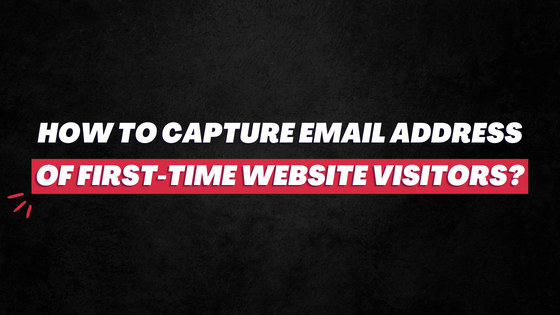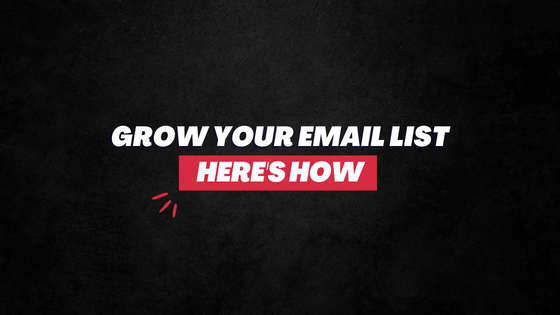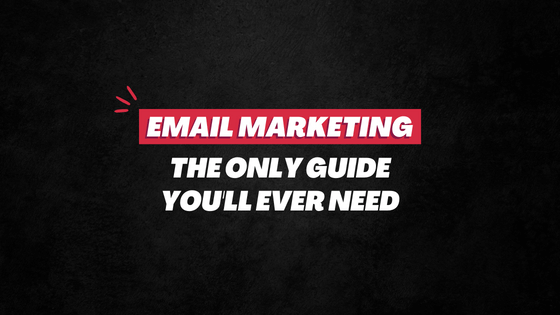- 40 percent of B2B marketers say email newsletters are most critical to their content marketing success.
- More than 59 percent of marketers say email is their biggest source of ROI.
(Source)
There are countless such email marketing stats that underline how email marketing remains relevant (and effective) even in 2020.
But the “big” results are achieved only if your campaigns and strategies are right.
And to get things right, you must avoid the wrongs.
This is what this article will help you with.
You want to run a high-converting email campaign…
Just avoid the following 21 email marketing mistakes and you’ll race to your goals in no time:
NOTE: If you’re looking to learn A-Z about email marketing, please check out: Ultimate Email Marketing Guide 2020 [Beginners + Advanced]. This is the ONLY guide you will ever need! 🙂
Now let’s dive into the email marketing mistakes…
1. Not Enough Opt-in Forms On the Website
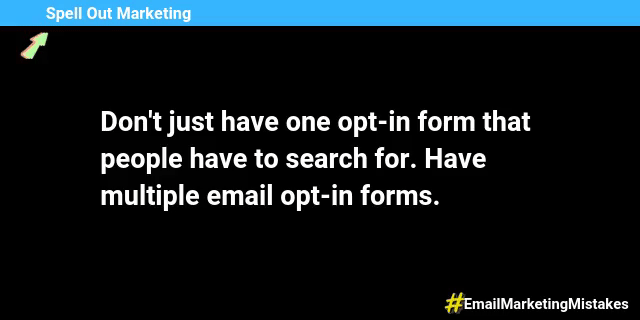
Your website must have multiple opt-in forms.
And, preferably, each opt-in form must have its own unique proposition or lead magnet.
Visitors need to be reminded that you want their email address. They need to be reminded that they should give you their emails.
If you’re relying on just one sign-up form, not surprisingly, few people would give you their email addresses.
So, wherever it makes sense, have opt-in forms on the site: Above the fold, at the bottom of the page, sliders, popups, hello bars, and more.
However, remember to not overdo it.
You don’t want to have too many forms everywhere that make your site look obnoxious and even come in the way of good UX for the visitors.
2. Not Sending a Welcome Email
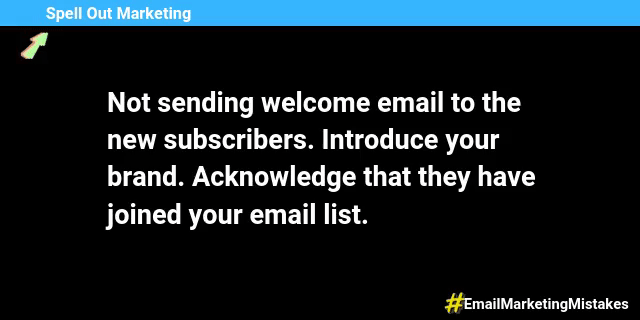
When you meet someone new, you do introduce yourself to them, don’t you?
Here, it’s no different.
When someone joins your email list, you must acknowledge that. You must introduce yourself, your brand, what you do, and what kind of emails should they expect from you.
If you don’t – if a few days have passed by since they joined your email list and you haven’t sent them an introductory email – they would likely forget about you. (Unless you have high brand value!)
And when that happens, your next set of emails would likely have a low open rate and CTR because…
- The person might not even remember you.
- The person might not find your emails relevant.
- Coming from a stranger, the person might not engage with your emails.
Bad deliverability would virtually kill your email marketing campaign.
So, once someone has signed up, take this as a clean board – a great opportunity to…
- Set the right impression.
- Introduce the personal side of yourself or your brand.
- Set the tone for the following communication.
- Make them understand why they will love your emails.
- Get them excited about your next email.
- Get acquainted with each other.
In short, NEVER forget to send your welcome emails.
3. Sending Irrelevant Emails
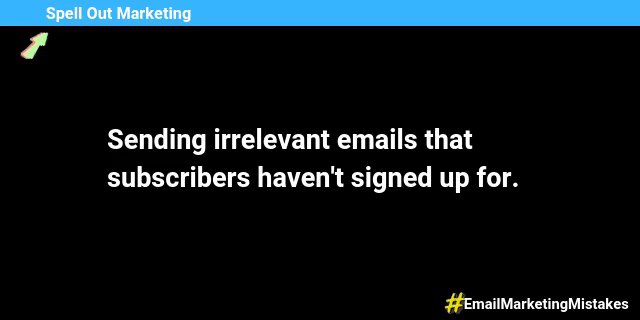
Someone signed up for a Workout cheat sheet and you sent them an article on fitness clothes – IRRELEVANT.
Someone signed up for a Workout cheat sheet, you sent them that cheat sheet but after a few days you start sending them emails about diet and fitness clothes – IRRELEVANT.
(In both cases, they are clearly interested in Workout-related things and not diet and clothes.)
Sending irrelevant emails is one of the big email marketing mistakes to avoid.
If I ask you to sign-up for my content marketing newsletters and start sending you emails on social media marketing, sure both are related on many levels – but you would still find those emails comparatively irrelevant.
And when subscribers don’t get what they want from you, it’s going to hurt your conversion.
4. Not Defining Your Email Marketing Goals
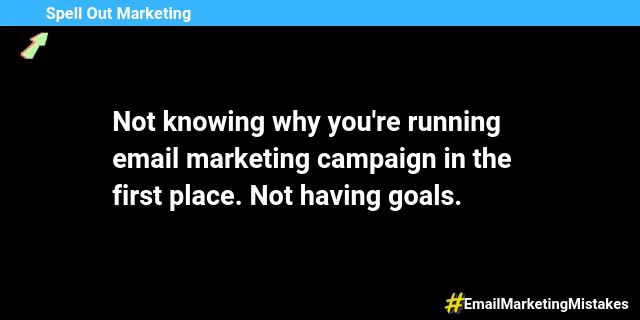
Why do you want to run an email marketing campaign?
Why are you sending emails to your subscribers?
Heck, why are you even asking visitors to subscribe to your email list?
Having goals in digital marketing campaigns is VERY important.
If not, no matter how much effort you’re putting in, no matter how good the metrics look – you’ll always fail.
(After all, when you don’t know where you’re going, you’ll always remain lost. Right?)
So, before devising your email marketing strategy, be extremely certain about why you want to run an email campaign in the first place, what’s the purpose, and what you want to achieve.
5. Providing Unclear And Vague Call-To-Action
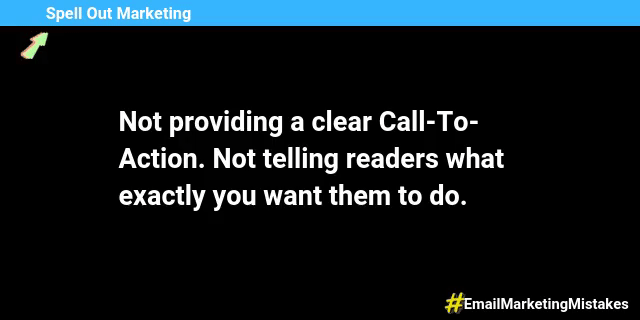
The readers need to be told what they should do next.
You must tell them what you want them to do once they have completed reading the email.
And you must tell that very clearly.
The CTAs of your emails should be very clear and direct.
Ask them to click on the link. Tell them exactly what they will get on the other side of the link. Give them enough reasons to click on that link.
But most importantly, tell them very clearly that you want them to click on the link.
Creative CTAs on landing pages like [“I want to lose weight” “Yes, I want to look good”] look interesting.
However, in emails, you want to stick to the basics like [“If you want to lose weight…… click here” “If you want to look good……. please go here and check out…..”] are the best.
6. Making The Emails Very Design-Heavy
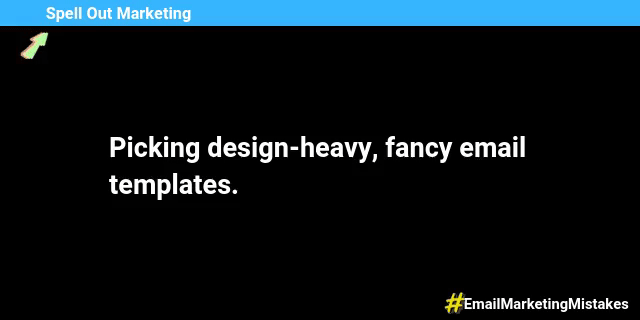
Keep it simple.
Avoid fancy designs.
Yes, they look good but there’s a big chance that they would also end your email in the spam folder or promotion tab.
Keep the email in plain text. Use images at the minimum.
This isn’t to say that design-centric emails never end up in the primary inbox. They do! But the probability is very low.
So, don’t test that probability. Stick to plain and simple good ‘ol text-based emails.
7. Non-Responsive Email Design
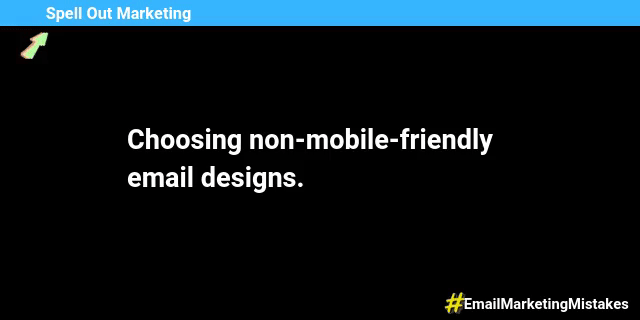
In case you do opt for a design-heavy email, a problem you’re likely to stumble across is unresponsive email templates.
So many marketers pick non-responsive email templates just because they “look great”.
This is the worst email marketing mistake…
More so today than ever when emails are opened more on mobile than desktop.
And non-responsive templates look ugly and incorrect on small devices; they are difficult to consume.
And according to Adestra…
- More than 70 percent of users delete an email if it displays poorly or incorrectly on mobile.
- As many as 15 percent of users will even unsubscribe if they can’t properly consume the email on smaller devices.
This is just a problem with heavy email designs.
Often, when you’re sending even text-based emails, due to poor formatting, they may not necessarily be responsive.
Including images in the email, too, can cause this problem sometimes.
So, when designing your email, Preview how it’s going to look on different devices. (Almost every top email marketing service provider offers this option.)
Avoid any template/formatting that’s non-responsive.
8. Being Too Salesy
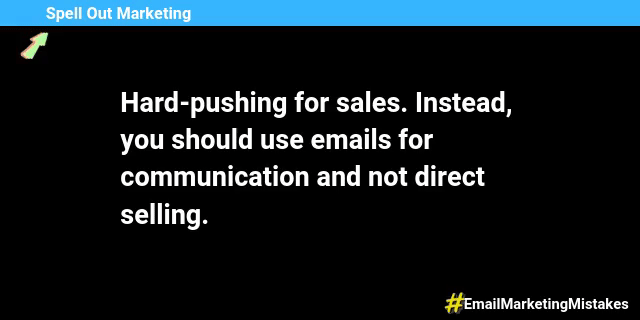
Originally, emails aren’t meant to sell; they are meant to communicate.
For as long as possible, avoid sending emails to sell. Use this channel to communicate.
(Of course, for certain niches like e-commerce, this might not be always possible!)
Remember, there are two purposes of email marketing – marketing and selling.
Unless you’re definitely hard-selling (meaning that’s your sole goal), you want to avoid using sales-heavy and pushy words/phrases.
Not that cold email campaigns don’t work. Or hard-selling doesn’t convert. THEY DO!
But if you take the marketing approach over the selling approach, where you first try to foster communication instead of the direct pitch – the conversion, although a bit delayed, will always be high.
Have an email marketing sales funnel for this to work out effectively.
9. Obsessing The Number Of Subscribers
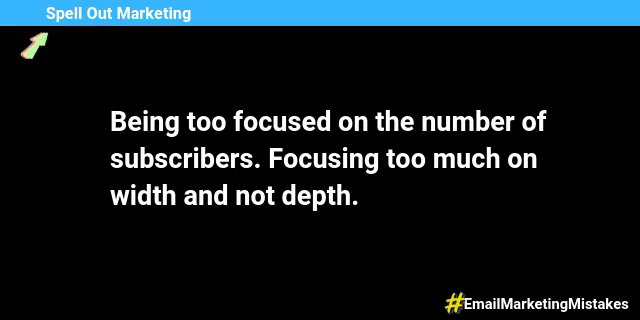
It’s good to have a large number of subscribers.
But what if most of them don’t convert? What if most of them don’t even open your emails?
This is a problem many marketers and bloggers face.
And this is exactly why you shouldn’t obsess about the size of your email list.
You should care– just as much if not more – about the deliverability, open rate, CTR, and conversion.
Focus on depth and not width.
Remember, you’re building an email list NOT for the sake of it but to drive value for your brand/business.
10. Being Inconsistent In Sending Emails
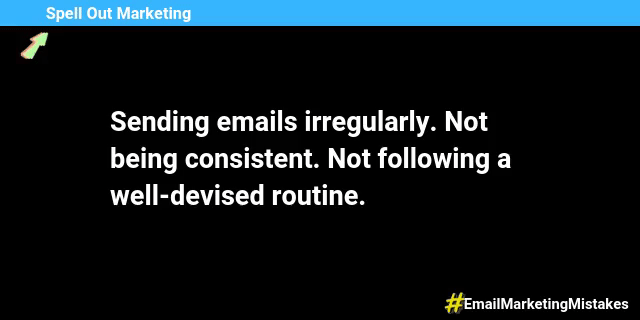
Just like in anything, consistency is the key even in email marketing.
You simply cannot send an email to your subscribers today and then send another one a month from now.
There should always be consistency in the communication – both in the duration and context of what you’re saying.
If not, the subscribers will forget about you; they will forget why they subscribed to your emails.
And when that happens, they will either unsubscribe you or never care to open your email to read. Both of these instances will hurt your deliverability and conversion.
It’s just like communication with friends. If you don’t talk to them regularly, things start fading away. And comes the point where you don’t care about each other beyond formalities.
Similar is with your email subscribers. You’ve got to be consistent and put in the work to make that relationship last.
11. Sending Too Many Emails In Quick Succession
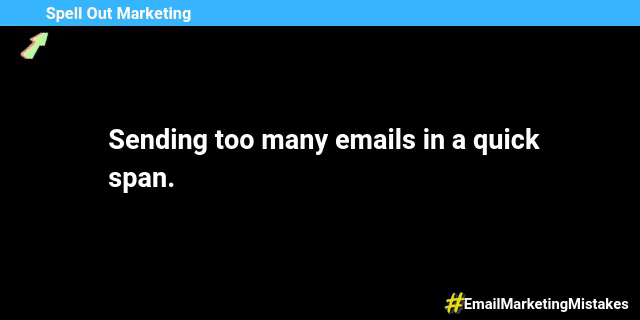
There are those who do not send emails – or take ages to do that.
And then there are those who send emails multiple times a day.
The number of emails you should send to the subscribers a week varies from niche to niche and the audience you’re targeting.
Generally, it depends on the kind of value you’re bringing to the table.
Do people like to engage with your brand? Do they want to read your emails? Do they get value from what you’re saying?
You can easily understand their interest in your emails by checking your analytics.
Many email marketing service providers offer decently powerful analytics dashboards. Check the deliverability, open rate, CTR, and overall ROI.
These numbers will reveal plenty of insights. And that will help you figure out how often you should email your subscribers.
Trying and testing and improving and testing some more is the key.
But if you’re still confused, simply find some of the top competitors and then see how often they email their subscribers.
Find out, follow their model, and then make adjustments per the ROI you’re getting.
12. Violating The Terms Of Service…
…of your email marketing service provider.
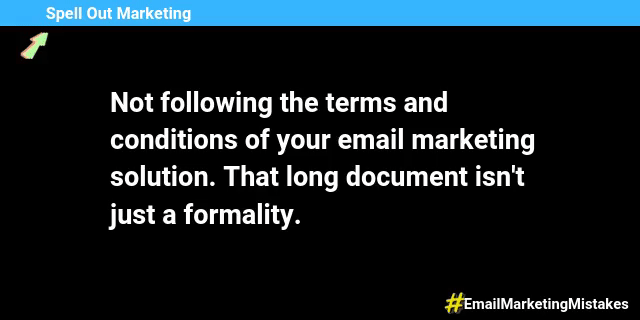
They aren’t just for the formality. Before using their product/service, you’re supposed to really read the terms and conditions.
Aside from providing you with the details about how you can prevent suspension of your account, these terms and conditions also offer a peek in acceptable email marketing practices that one should follow for maximum return.
So, for your own benefit, to be on the safer side, give the terms and conditions a casual read.
You will learn plenty of things, like about anti-spam rules, GDPR, how to use your subscribers’ details, the kind of emails you can send, and so much more.
13. Sending Everyone the Same, Generic Emails
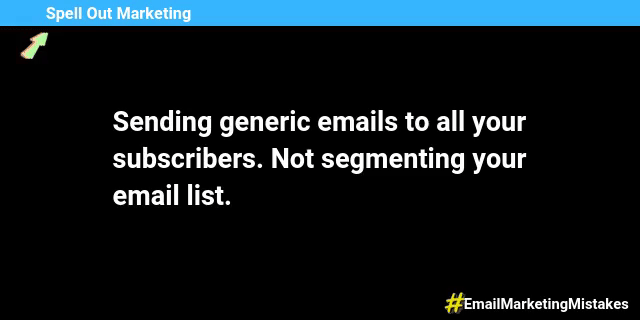
There’s a reason why email service providers offer segmenting feature… for people to use it.
And yet so many marketers ignore this part.
Segmenting your list enables you with personalization opportunities. And personalization is the most important part of CRO or Conversion Rate Optimization.
“Hey you from Ohio” will always convert better than just “Hey you”.
Here are some numbers from MailChimp via MarketingCharts…
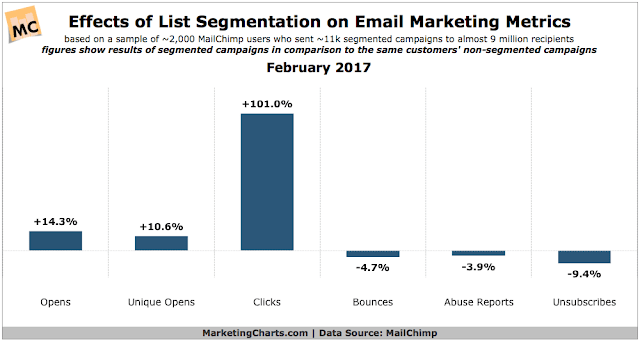
So, do not send the same, generic email to everyone.
Segment your list into different groups based on people’s interests, demography, website behaviors, past interaction with your brand, and more.
And then push them personalized emails.
Of course, if you’re looking for more/smart personalization, you’re going to need much more powerful segmentation features.
And for that, you’re going to have to invest in good email marketing software.
14. Not Spending Time In Analytics
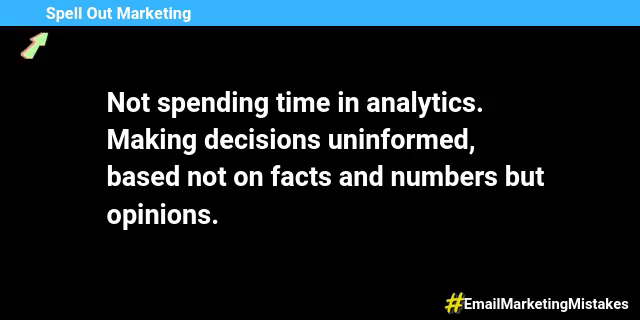
This is a problem for many – including myself.
There are two ways to improve the ROI of email campaigns:
- Make changes based on intuitions.
- Make changes based on facts and numbers.
No doubt, unless you have massive intuitive power, the second option sounds saner.
It’s much more efficient, quicker, and cost-effective. And it virtually assures of improvements in conversion.
Sadly, that’s not what many people do.
There are many who do not try to change and improve their campaigns in the first place.
And those who do, the majority of them don’t spend time in analytics, learn from the numbers and make informed decisions.
It’s one of the email marketing mistakes that slow growth and increases direct and indirect costs.
15. Not Personalizing The Emails
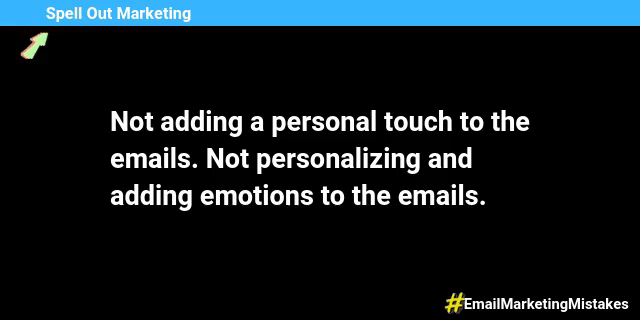
This is almost the same as #13 – not segmenting your email list and sending everyone the same generic emails.
The only difference is…
Even if you lack a proper database, even if you don’t have the basic info of your subscribers (demography, interest, more), you should still strive to personalize the tone of your email body.
Instead of “We hope you’re doing fine”…
Something like “Are you enjoying this breezy winter? We are!” sounds much more appealing.
AND
Instead of “Kindly revert back”…
Something like “We know you love hearing from us. This time we’ll be waiting for your email” feels much more engaging.
Here, personalizing is more than just knowing the name, address, and other details of your subscribers.
It’s about personalizing the tone of your email to make it come off as friendly.
16. Sending A Looong Email
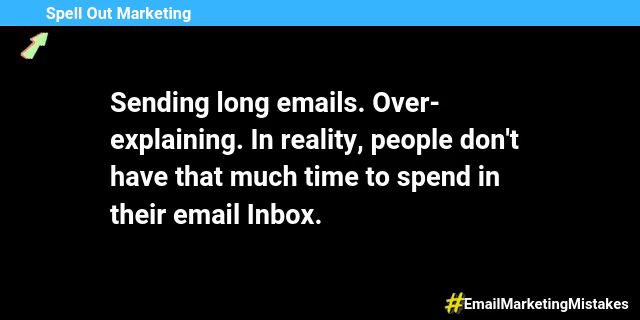
Unless you enjoy a good brand value and trust, this is a big mistake.
Nobody has that much time to read your long, essay-like emails.
Now, sure, when it makes sense, you can send long emails. Otherwise, you should strive to keep it as short and simple as possible.
Do not over-explain yourself.
Do not tip-toe around off-topics. (Something many do in the name of personalizing emails!)
Be straightforward. Tell them what you want them to do. And include a couple of links to provide context to what you’re actually saying. That’s it!
17. Waiting Till You Have Enough Subscribers
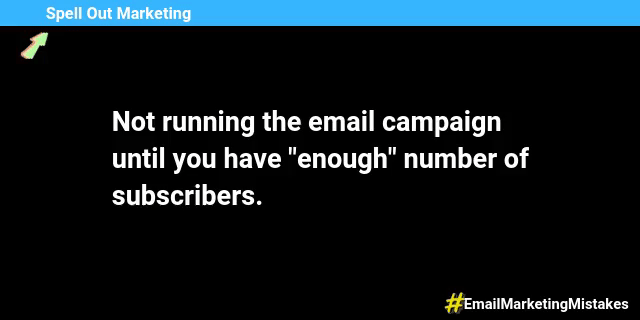
There’s plenty wrong if you’re waiting to have enough subscribers till you start your email marketing campaign…
One, if you’re not engaging with your existing subscribers, it will cost you big.
Because when you do send them an email eventually, they might not recognize you. Following, most of them will unsubscribe. Others won’t open the email or convert.
Also, keeping your email list unengaged and stale affects its deliverability.
There’s a good chance your emails might get filtered out in the Spam folder. If not, to the least, you can expect to end up in the Promotion tab.
Another reason why you shouldn’t wait for “enough subscribers” is that you might not reach your ‘enough’ soon.
We all want thousands of email subscribers. But it’s difficult to get there. It takes a lot of time. Some can’t get there even for years.
Do you really want to wait that long and risk losing the people who have already subscribed to your emails?
Are you going to let go of all that you have in your quest to get more?
Besides, you don’t really have to do this. You don’t have to wait till you have enough email subscribers.
Today, you can easily automate the entire email marketing process.
Whoever new joins your list, they automatically start receiving your emails at a set interval.
An automated drip email campaign can keep them engaged without any time-consuming manual intervention on your end.
Recommended Read: Free Email Automation on MailChimp: A Complete Guide
18. Hyping And Overselling In The Subject Line
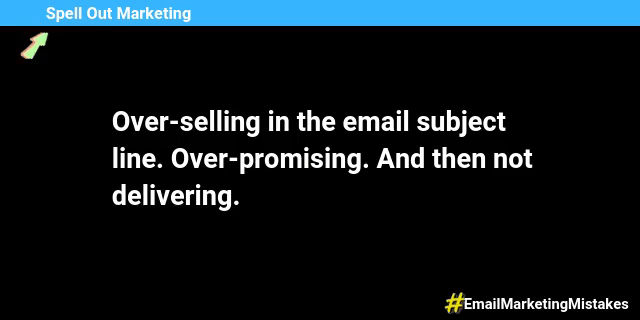
Similar to clickbait titles of blog posts.
You over-sell your content in the subject line. And when someone clicks on it and reads the email body, they find no value that they were promised.
This leaves a bad impression in their mind regarding you and your brand.
As it continues happening, the less likely your subscribers are to open your emails, click on links and convert.
They will not engage with your emails. This will eventually push your emails off their Primary inbox, into the Promotion tab and even the Spam folder.
Many of them would even unsubscribe out of frustration for not getting the value they are promised.
So, while you should make your subject lines appealing and clickable, you must keep them realistic.
Exaggerating and then not following up on that over-promise will upset your subscribers.
19. Not Encouraging Readers To Respond To The Email
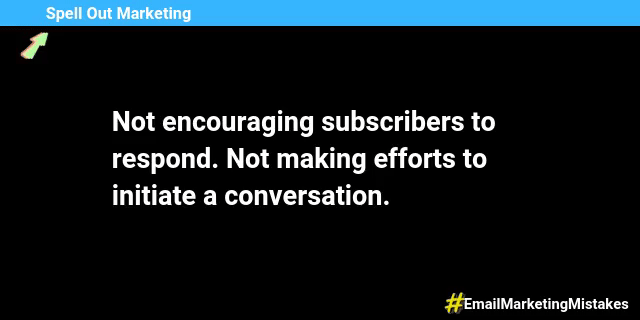
This isn’t a big email marketing mistake – but still is one nonetheless.
You should encourage your subscribers to respond to your emails.
When people engage with your emails, it improves your deliverability.
The chances of ending in their primary inbox improve. This then increases the open rate and conversion.
Moreover, when email engagement is high, it also opens plenty of opportunities to build a brand.
And good brand recognition and trust unlock seamless business opportunities.
So, whenever it makes sense ask people to respond to your emails. Ask them questions. Ask them what they want from you. Ask them about their problems and the kind of solutions they are looking for.
Gather this data to improve your email marketing campaign.
20. Not Cleaning Your Email Lists
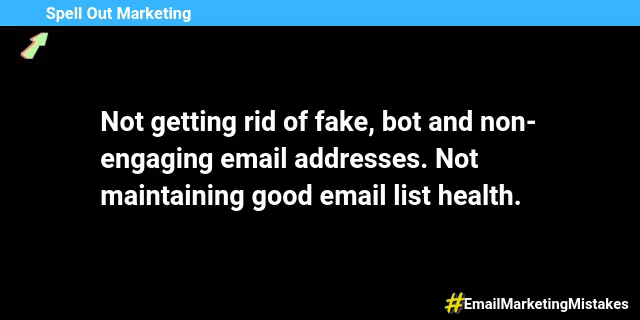
Cleaning your email lists often is important for various reasons.
A lot of email addresses in your lists are simply bot and fake. This is a common problem when you don’t have a double opt-in option – wherein the subscribers don’t have to confirm.
Sending emails to these invalid addresses would add to your expense.
Also, these addresses will return back as hard bounces. And many email marketing service providers, in their terms, confirm that if your hard bounce rate is higher (>5%), you risk getting your account suspended.
Even if your account isn’t suspended, hard and soft bounces hurt the credibility of your IP, which then eventually hurts your deliverability. Your emails then get filtered in either the Spam folder or the promotion tab.
So, you’ve got to regularly clean your email lists.
Get rid of addresses that look fake and invalid.
Then head over to your analytics to find who are those people who never open your emails. If they haven’t engaged with your emails in more than 4 months, you’re better off deleting them.
Do this often. Maintain good email list hygiene.
Recommended Read: How to Clean Email List For Free (And The Right Way)
21. Not Actively Improving Your Email Campaign
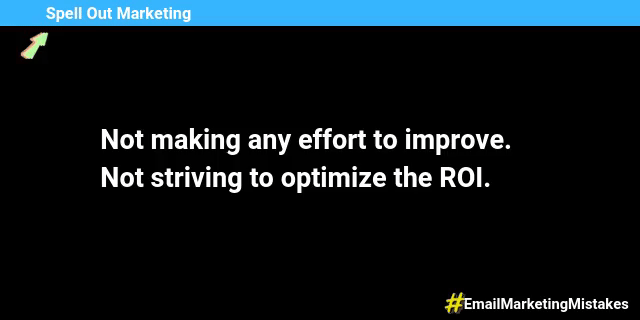
This is okay-ish for those who are getting a decent ROI.
But for those whose campaigns are evidently ineffective and failing, not actively improving their email campaigns can be fatal.
If you’re running multiple campaigns, you’ve got to keep an eye on their returns. You’ve got to check their analytics regularly.
Following, you must make changes to them in order to improve the results.
Sadly, for whatever reason, what many do is stick to the same campaigns that aren’t returning good conversions with the hope that it would get better – that on the lucky days, recipients will open their emails and click on the links.
Don’t be one of them!
Constantly experiment and improve.
Conclusion
These are 21 common email marketing mistakes bloggers, SMEs and agencies make. Unsurprisingly, their campaigns usually fail to deliver them the desired result.
Steer clear of these blunders when creating and executing your email marketing strategy.
If you need any help or have any questions, feel free to connect. Either tweet to @SpellOutMarket or just email me through the contact page.
If you’re looking to learn about email marketing, check out this super-amazing post I wrote: Ultimate Email Marketing Guide 2020 [Beginners + Advanced]
I am sure it would bring you high value! 🙂
If you liked this post, please share it on LinkedIn.
